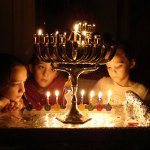Hanukkah Date in the current year: December 5, 2026
 Hanukkah, also transliterated as Chanukah, is a Jewish eight-day festival of lights that starts on the 25th day of the month of Kislev. It commemorates the re-dedication of the Second Temple in Jerusalem during the Maccabean Revolt, following Judah Maccabee’s victory over the Seleucids.
Hanukkah, also transliterated as Chanukah, is a Jewish eight-day festival of lights that starts on the 25th day of the month of Kislev. It commemorates the re-dedication of the Second Temple in Jerusalem during the Maccabean Revolt, following Judah Maccabee’s victory over the Seleucids.Judea became part of the Seleucid Empire of Syria in 200 BCE. King Antiochus III the Great didn’t want to antagonize his hew subjects, and so he allowed them to continue practicing their religion in the Temple of Jerusalem. However, things changed when the king died and was succeeded by his son, Antiochus IV Epiphanes.
In 175 BCE, Antiochus IV Epiphanes invaded Judea and looted the Second Temple in Jerusalem. An altar to Zeus was erected in the Temple, and pigs were sacrificed at the altar. The king banned brit milah (circumcision) and other Jewish ceremonies and customs in an attempt to make Jews abandon their religion and worship Greek gods instead.
Antiochus’s attempt to Hellenize Jews provoked a large-scale Jewish revolt. It was lead by Jewish priest Mattathias ben Johanan, also known as Matityahu the Hasmonean, and his five sons. After Mattathias’ death, his third son Judah Maccabee (Judah “The Hammer”) took over as leader.
The Maccabean Revolt against the Seleucid Empire lasted several years. The rebels used guerrilla tactics because their forces were significantly smaller than the Seleucid army. The use of guerilla warfare, as well as their lightness and mobility, helped the Maccabees defeat the Seleucid army and recapture the Temple.
After the victory, Judah Maccabee ordered the Temple to be cleansed and rededicated. As the Maccabees were going to light the menorah (the seven-branched ritual lampstand), they realized that there wasn’t enough consecrated olive oil left to keep the menorah burning. They found enough kosher oil to burn for one day, and it would take them eight days to prepare a fresh supply of oil.
Nevertheless, Judah Maccabee decided to light the menorah, and a miracle happened: the oil burned for eight days, the time needed to prepare a fresh supply of kosher oil. Jewish sages declared an eight-day festival to commemorate this miracle and celebrate the victory of the few (a handful of Jewish rebels) over the many (the entire army of the Seleucid Empire).
Hanukkah lasts for eight days. As Hanukkah is not mentioned in Torah, its customs tend to be more informal. There is no obligation to refrain from work, so people go to work as usual, although in Israel schools close for a week-long vacation.
The most important Hanukkah ritual is the kindling of the Hanukkah menorah, also called hanukkiah or chanukiah. Unlike the menorah used in the ancient Temple, it has nine branches instead of seven. On the first night of Hanukkah, Jews light only one candle, and then the number of lights is increased by one each holiday night. The ninth candle, called the shamash (“servant” or “helper”), is used to light all other candles.
During Hanukkah, people also eat foods fried or baked in oil (potato pancakes, doughnuts) and play a game of sevivon (called a dreidel in Yuiddish). Children are given Hanukkah gelt – money and/or chocolate coins.
- Category
- Religious Holidays
- Country
- Israel
- Tags
- Hanukkah, Chanukah, holiday of lights, Jewish holiday, religious holiday, the Holy Temple